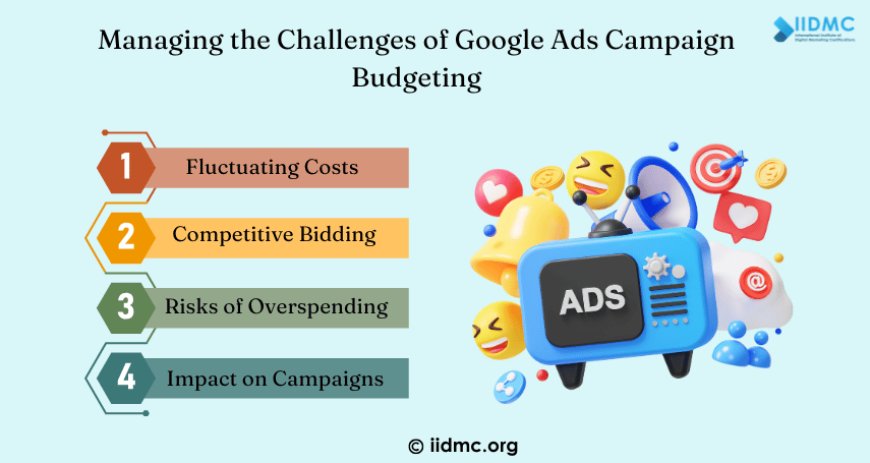Budgeting Strategies for Google Ads Specialists
Learn budgeting strategies for Google Ads specialists to maximize ROI, optimize ad spend, and ensure campaign success.

To maximize ROI, allocate resources efficiently, and reduce costs, Google AdWords budgeting is essential. By establishing expenses limits, it promotes budgeting and guards against excessive spending. Google AdWords specialists deal with issues like tight budgets, the need for strategic prioritizing, and rising costs per click (CPC) due to competition. Seasonal variations necessitate preventive modifications, while ongoing observation allows reallocation to profitable regions. Effective budget management requires adjusting to the changing dynamics of Google's platforms and algorithm changes. To put it simply, budgeting requires data-driven optimization, strategic planning, and a deep understanding of market dynamics on the part of Google Ads specialists in order to accomplish desired outcomes within specified limits.
Understanding the Google Ads Budgeting Environment:
-
Dynamic Environment: Market demand, competition in the industry, and advances in technology all have an impact on the dynamic and competitive environment in which Google AdWords budgeting operates.
-
Advertising Goals: Organizations allocate funds to Google Ads campaigns according to specified objectives, which may include raising brand awareness, boosting website traffic, or producing leads and sales.
-
Advertising Options: Google advertisements provides a range of advertising options, each with specific targeting features and pricing structures. These possibilities include search advertisements, display ads, video ads, and shopping ads.
-
Cost variables: A number of factors, including quality score, ad relevance, and keyword competitiveness, affect the cost per click (CPC) and overall campaign performance when it comes to the cost of advertising on Google Ads.
-
Data-Driven Decision-Making: As budget allocation becomes more efficient and campaign performance improves, advertisers are turning to data-driven strategies.
-
Automation and Machine Learning: These two areas of technology are vital to budget management because they enable advertisers to maximize return on investment, optimize bids, and streamline operations.
-
Constant Monitoring: In order to accomplish their advertising goals within financial limits, advertisers must continuously assess the performance of their campaigns, modify their bidding strategies, and spend funds wisely.
-
Agility and Strategy: To ensure the success of their advertising campaigns, advertisers must maintain an agile, knowledgeable, and strategic approach to budget management in the dynamic Google Ads marketplace.
Managing the Challenges of Google Ads Campaign Budgeting:
Google AdWords campaign budgeting is a complex process with many moving parts brought on by dynamic bidding, changing prices, and the need for the best return on investment. An examination of these issues and their effects is provided below:
-
Fluctuating Costs: The cost per click (CPC) for keywords in Google AdWords can fluctuate dramatically over time due to the dynamic nature of the industry. Accurate cost prediction and management is difficult due to factors that affect CPC, including seasonality, market demand, and competition activity. In order to maintain competition while staying within budgetary restrictions, advertisers must constantly assess keyword performance and modify their bids.
-
Competitive Bidding: As advertisers compete aggressively for the best ad positions, bidding wars get worse, raising CPC and making it more difficult for advertisers to stay visible within budgetary constraints. Refinement of keyword targeting and improvement of ad quality are two crucial bid management techniques that are necessary to maintain competitiveness without going over budget.
-
ROI Optimization: Finding the best return on investment (ROI) necessitates striking a careful balance between performance optimization and budget distribution. Advertisers need to spend as little money as possible on underperforming assets and give priority to keywords and campaigns that convert well. To maximize return on investment while staying within budgetary limitations, landing pages, targeting standards, and ad creatives must all be continuously tested and refined.
-
Risks of Overspending or Underspending: Excessive Google AdWords spending might quickly empty budgets, resulting in lost opportunities and inefficient campaign performance. On the other hand, cutting costs too low could lead to lower ad visibility and lost revenue opportunities. Achieving campaign goals while optimizing budget efficiency requires finding the ideal balance between overspending and underspending.
-
Impact on Campaign Performance: Budget mismanagement has an effect on a campaign's overall performance in addition to its financial consequences. When advertising budgets run out without producing equivalent outcomes, overspending can result in decreased returns. On the other hand, if you spend too little, your campaign's effectiveness and reach may be limited, which could negatively impact ROI and growth prospects.

What strategies can Google Ads specialists employ to effectively manage their budgets?
Google Ads specialists have a number of tools at their service to efficiently manage their budgets, including:
-
Set Clear Goals: Prior to initiating any campaign, it is imperative to establish measurable and unambiguous objectives. Budget allocation will be guided by specific objectives, whether they be for generating leads, growing sales, or driving visitors to a website.
-
Money Segmentation: Depending on the effectiveness and significance of each campaign, ad group, or even individual keyword, split your money wisely. Increase the budget for campaigns that are performing well or that are focusing on important keywords.
-
Use Bid Adjustments: You can use bid adjustments to manage expenditure according to audience demographics, device, location, and time of day. This enables you to more effectively distribute funds to the parts that produce superior outcomes.
-
Regularly Check Campaign Performance: Pay careful attention to how your campaigns are performing and make necessary adjustments. To maximize return on investment, identify failing campaigns, keywords, or advertising and reallocate funds to higher-performing areas.
-
Ad scheduling: Ad scheduling should be used. Arrange for advertisements to run on particular days and times when your target market is most engaged. This keeps money from being wasted at times when conversions are unlikely to happen.
-
Optimize Keyword Bids: Keep a close eye on keyword bids and make necessary adjustments based on performance. To achieve optimal spending, increase budget allocation to high-converting keywords and decrease bids for less effective ones.
-
Use Negative Keywords: To stop your advertising from appearing for unnecessary searches, use negative keywords to exclude irrelevant search phrases. This increases ad relevance and decreases as waste.
-
Try Different Ad Formats: See which of your target audience's preferred formats such as text, display ads, or video ads perform well by experimenting with them. Spend money according to how well each ad format performs.
-
Use Automated Bidding methods: Target CPA (Cost Per Acquisition) and ROAS (Return On Ad Spend) are two examples of automated bidding methods that Google Ads offers. These strategies can help you optimize spending depending on your unique performance goals.
-
Take Conversion monitoring into Practice: Conversion monitoring can be set up to precisely measure the effectiveness of your efforts. This lets you link conversions to particular ads or keywords and manage your budget based on statistics rather than guesswork.
Using a dynamic approach that combines data-driven optimization and strategic planning is necessary for efficient budget management in Google Ads. Advertisers have to negotiate a challenging environment of variable expenses, aggressive bidding, and ongoing ROI optimization. Within certain bounds, experts can optimize the results of their campaigns by establishing specific goals, wisely allocating resources, and utilizing instruments such as automated bidding and bid modifications. In the dynamic world of Google Ads, it takes constant observation, flexibility in response to changing market conditions, and a dedication to testing and improvement to retain budget efficiency and achieve desired results.





























